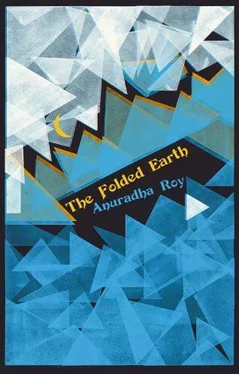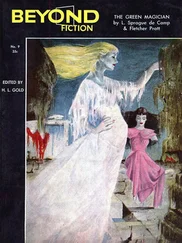The younger Negi came to Puran with an expression of exaggerated patience. “Back again?” he said, and handed him a glass of tea and four fat slices of bread. Puran scurried away with his tea and bread across to the low parapet that ran all the way down the western edge of Mall Road, and sat on it eating in a hurry as if the bread was in danger of being snatched away from him. A ring of woolly dogs formed around him, looking up with pleading eyes and drooling tongues. Puran dropped them scraps and the dogs snarled and yelped as they fought over the food.
Mr Chauhan turned to me in triumph and said, “See? See what I mean? Yesterday I told my secretary — we were in the car — please make a note, I said, too many stray dogs. I would like a list — all dogs’ descriptions and names in one column and owners’ names in the second column. Any dog that does not have a licence must go. We will draw up regulations for licensing dogs and this … beggar? There should be no beggars in an army cantonment. We must be an example for the rest of India. I’ll fix this man. That is what I said.”
He returned to the door of his white Gypsy, whose bright red beacon had been spinning like an angry top all through our conversation. The car roared to life and took him away down Mall Road. Puran sat on the parapet oblivious. The stray dogs lolled at his feet, contented after their snack. The darkening mountains behind him began to swallow the blood-red sun as it turned from a disk to a sliver, slowly disappearing from view.
* * *
That night, I sat at my window in a trance gazing at the fires in the forest. What would happen to the animals that lived in the undergrowth if a wind were to fan those slow fires into a blaze? They were always in danger. One year Puran had run into the flames in the middle of the night and come back with a singed fox cub; another year he had rescued a baby monkey from the burning forest and the next morning a whole family of monkeys had appeared on our doorstep, agitating for its release in angry screeches and chatters.
I was lost in worried thoughts about Puran and Mr Chauhan’s threats to “fix” him when I heard a faint knock on my door downstairs. It was past ten o’clock, the neighbours were asleep. My light was the only one on; I was supposed to be correcting the English class test. At first I thought the knock was a figment of my imagination and applied myself to the exercise book I was working on. And then I heard it again.
Nobody visited this late in Ranikhet. My stomach gave a lurch. This was the call in the night I had known would come one day. Something had happened to Diwan Sahib and Himmat Singh had come to call me. I raced down the stairs and unlatched the front door in a panic.
It was Veer. His nose was peeling with sunburn and his face was thinner than usual from the weeks he had been away walking and climbing. His normally close-cropped hair had grown. That, and an unfamiliar beard, made him look a stranger. For a second my mind sprang to my last night with Michael when I had brushed my fingers over his clean-shaven cheeks in anticipation of the beard he came back with from every trek, when I had pinched the roll of fat around his stomach knowing he would lose it in the weeks away.
Veer was standing so close to me I could smell his sweat. His jeans were dirty and his shoes muddy. I was stabbed by a sudden, fierce need to bury my face in his shirt although it hung on him grimy with dirt. But I remembered the way he had driven away without a look at me. “You’re back,” I said. And then: “I’ve piles of work to finish.”
He took his shoes off at the door and brushed past me into my kitchen. He went to the shelf where I stacked old newspapers, and extracted one, which he laid on a corner of the kitchen floor. He placed his shoes on the precise centre of the newspaper and said: “See how muddy they are? All your rugs would have been filthy.” He helped himself to water from the steel filter and drank it in gulps, saying in between, “Hot, hot. Monsoon delayed. But C.N.N.’s predicted rain. It’ll come tonight. It’s so still. You can feel the thunder.”
He washed the glass and set it down with the same precision upon the kitchen counter, opened the fridge and examined the jug of milk, cubes of cheese, and the ageing lemon it contained, and shook his head saying, “Don’t you ever eat real food?” He wandered into my living room and paused before the framed picture. It was a photographic panorama of the peaks visible from Ranikhet, with their altitudes written alongside. Why was he examining a picture he must have seen in every house in these hills, I wondered? Was he planning to show me the places his climbs had taken him to? Now? At this hour?
Veer’s hands, resting on the back of a chair, were deep in the folds of a dusty-pink cardigan I had left draped on it. I noticed that his fingers were moving in the wool, kneading it. I knew then why he had come, even before he began to speak. “Every day on this trek I’ve been thinking that I’ve seen dozens of beautiful places in the world,” he said, “and most of its mountain ranges. And I know for sure that there’s nowhere else I would rather be than the Himalaya, and in the Himalaya, Ranikhet, and in Ranikhet, the corner of it that has you.” He turned away from the picture and towards me with a deep breath that he exhaled in a rush. His eyes shone, half-terrified, half-exultant, when unexpectedly, he pointed to his feet and laughed. “Look,” he said, “obviously you scare me more than the worst crevasse.” One of his socks was blue and the other dark green.
That night a cool, moist breeze began ruffling the trees, making a sound like the sea. Pine cones clattered onto the roof. The stars disappeared and thunder boomed. Sword-blades of brilliant white light sliced open the glowing red sky. The breeze grew into a wind that howled and banged. My little house on the edge of its spur became a tilting boat. The wind blew in sprays of rain through the open windows and we closed our eyes to the mist of water as if we were not in the mountains but on a wave-thudded beach. Far below, the still-smouldering, smoking forest began to calm at last.
* * *
Mindful that gossip was almost the only entertainment in a town as small as ours, we did our best to be discreet. Veer came rarely to my house. When he did, it was late at night and he left before dawn. He never left his shoes or umbrella outside my door. When we wanted to be together, we drove miles out of Ranikhet, to one of the isolated hillsides that surround the town. We put a rug on the pine-cushioned forest floor and lay there with nothing above us but the sky in its mesh of pine fronds. It felt as if we were the only two people in all of the jagged, wild, precipitous Himalaya — until we found a goat looking at us, soon followed by a curious goatherd. Sometimes children scampering between school and village through the jungle stopped and gawped at us until I felt ready to brandish a stick at them. But I still preferred this to Ama’s watchfulness, and to prevent anyone seeing us together when we returned, I got out of the jeep some distance from home and walked back by a different route, so that we arrived separately.
However foolproof our stratagems, the young widow’s liaison with her landlord’s relative very quickly became the talk of the hillside. Within days I felt gossip eddying around my ankles. One morning, from my window, I saw Ama in my garden, poking at the earth with her stick, apparently examining my plants. When I came outside she rambled on about the flowers on the cucumber vine, how her beans were being eaten by pests and about Puran’s deer, which had disappeared for two hours the day before, driving him to distraction. I was growing weary of waiting for her to come to the point, when she looked skyward as if she were going to talk about the rains and said, “Do you know about Gappu Dhobi’s younger Bahu?”
Читать дальше












